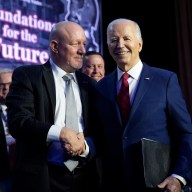By Lawrence Hurley and David Ingram
WASHINGTON (Reuters) – A unanimous U.S. Supreme Court on Monday threw out Republican former Virginia Governor Robert McDonnell’s bribery convictions in a ruling that could make it tougher to prosecute politicians for corruption. The eight justices, liberals and conservatives alike, overturned McDonnell’s 2014 conviction, saying that his conduct fell short of a “official act” in exchange for a bribe as required for conviction under federal bribery law. “Setting up a meeting, calling another public official or hosting an event does not, standing alone, qualify as an official act,” Chief Justice John Roberts wrote for the court.
The court found that the conduct that led to his conviction may not actually have been illegal. It said the expansive interpretation of bribery law used by federal prosecutors and the instructions given to the jury in the case threatened to criminalize behavior that politicians engage in routinely. Jurors convicted McDonnell, a former rising star in the Republican Party, for accepting $177,000 in luxury gifts and sweetheart loans for him and his wife, Maureen, from a wealthy Richmond businessman seeking to promote a dietary supplement. He was sentenced to two years in prison but remained free pending appeal.
McDonnell, 62, said in a statement he was grateful for the ruling. “It is my hope that this matter will soon be over and that my family and I can begin to rebuild our lives,” he said.
The issue before the court was whether the gifts and money were part of an unlawful arrangement in which a sitting governor, in return for accepting them, employed the power of his office to benefit businessman Jonnie Williams. The case was a rare instance of the nation’s highest court reviewing a high-level public official’s criminal conviction. The court sent the case back to lower courts to determine if there is sufficient evidence for a jury to convict McDonnell. He still could face a new trial. McDonnell’s lawyer, Noel Francisco, said federal prosecutors should drop the charges.
“This court’s ruling sends a very strong message that the entire theory this prosecution rested upon was flawed,” Francisco said in a telephone interview. “Now that that theory is completely gone, we think the case is gone.” Dana Boente, the U.S. attorney for the Eastern District of Virginia, where McDonnell was convicted, said in a statement his office was reviewing the decision and did not have any further comment.
‘TAWDRY TALES’
Roberts stressed that the ruling was prompted by overzealous federal prosecutors rather than any sympathy for McDonnell.
“There is no doubt that this case is distasteful; it may be worse than that,” Roberts wrote. “But our concern is not with tawdry tales of Ferraris, Rolexes and ballgowns. It is instead with the broad legal implications of the government’s boundless interpretation of the federal bribery statute.” McDonnell was found guilty of 11 corruption counts including bribery, conspiracy and extortion for taking the gifts and loans in exchange for promoting a dietary supplement called Anatabloc made by Williams’ company Star Scientific. A federal appeals court later upheld the conviction. Prosecutors argued that McDonnell took official acts in return for the gifts and money, such as arranging meetings, which they portrayed as a classic tale of political corruption.
The ruling opens the possibility that politicians could sell meetings and other forms of access without violating federal law, said Randall Eliason, a former federal prosecutor.
“Access can be very important, especially when it’s being arranged by someone’s boss,” said Eliason, who now teaches law at George Washington University.
McDonnell served as governor from 2010 to 2014 and once was considered as a possible U.S. vice presidential candidate. His wife was convicted in a separate trial and given a one-year sentence but remained free while pursuing a separate appeal. The Supreme Court did not act on Maureen McDonnell’s conviction, but its ruling applies no less to her and “requires that her conviction immediately be tossed out as well,” her lawyer, William Burck, said in a statement. “Mrs. McDonnell, like her husband, was wrongfully convicted.” Prosecutors during the trial described the luxurious lifestyle the McDonnells lived, despite being heavily in debt, thanks to Williams including vacations, designer clothing and shoes, a $6,500 Rolex watch, use of a Ferrari sports car, $15,000 for their daughter’s wedding, golf outings and more. The trial also exposed fissures in their marriage. In New York, two former leaders of the state’s legislature convicted last year in separate corruption trials, Sheldon Silver and Dean Skelos, had already indicated they would rely on appeal on any decision in favor of McDonnell. (Reporting by Lawrence Hurley and David Ingram; Additional reporting by Nate Raymond; Editing by Will Dunham)

















